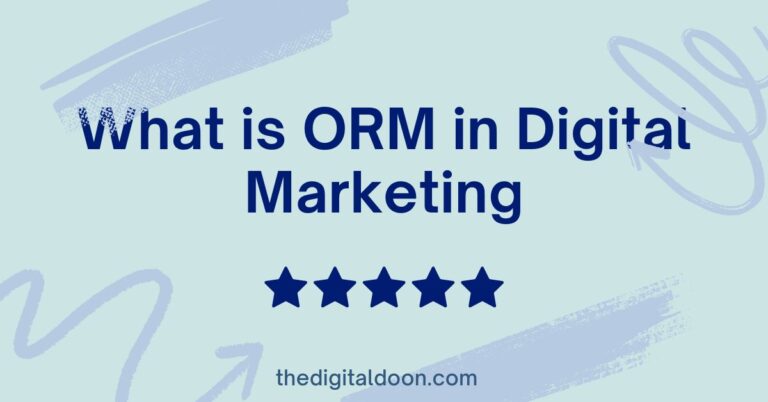If you are new to digital marketing, you might hear people talk about ORM. Don’t confuse it with the technical term from programming! In the world of marketing, ORM in Digital Marketing stands for Online Reputation Management.
Simply put, ORM is about managing what people see and think about your business online.
What does ORM mean in Digital Marketing?
Imagine you are planning to buy something online—let’s say a new phone. Before buying, what do you usually do? You probably check reviews on Google, social media, or websites like Amazon.
If the reviews are positive, you feel confident and buy it. But if the reviews are bad, you might avoid it.
That’s exactly what ORM is all about: making sure that when people search for your brand or product online, they see positive content that builds trust.
Why is ORM important?
In today’s digital world, your reputation is everything. Even one bad review or negative comment on social media can hurt your business. Customers trust what other people say online more than what you say about yourself.
Here’s why ORM matters:
Builds trust – Good reputation attracts more customers.
Improves sales – Positive reviews = more people willing to buy.
Protects your brand – Helps handle negative comments in a smart way.
Boosts visibility – Positive content ranks higher in Google.
How does ORM work?
ORM is a mix of strategies and activities that help control your brand’s image online. Here’s how it works:
Monitoring – Keep an eye on what people are saying about you on Google, social media, and review platforms.
Responding – Reply politely to reviews (both positive and negative).
Creating positive content – Publish blogs, videos, social media posts, and news articles that highlight your brand in a good way.
Pushing down negative content – Use SEO techniques to make positive content appear on the top of search results so that negative stuff gets less attention.
Real-life example of ORM
Let’s say you run a restaurant. One unhappy customer writes a bad review on Google: “The food was cold and the service was slow.”
Without ORM: That review stays on top, and potential customers see it first → fewer people come to your restaurant.
With ORM: You quickly respond, apologize politely, offer a free meal next time, and also share positive customer experiences on your website and social media. Slowly, positive reviews outweigh the bad one → your reputation stays strong.
Tools used for ORM
Google Alerts – To get notified when your brand name appears online.
Social Media Monitoring tools – Like Hootsuite or Sprout Social.
Review Platforms – Google Reviews, Yelp, Trustpilot.
SEO tools – To push positive content higher.
Final Thoughts
ORM in digital marketing is simply managing your online reputation. It’s about making sure your customers see the best side of your business when they search online.
Think of ORM as your digital PR (Public Relations). Just like in real life, reputation takes time to build but can be damaged quickly. With proper ORM, you can protect your brand, build trust, and grow your business successfully.



2 Comments
Your comment is awaiting moderation.
Sabong67? Alright, if you’re into that sort of thing… Heard it’s got good streams, but I’m not judgin’. Just be careful out there, yeah? See for yourself: sabong67
Your comment is awaiting moderation.
從英超、西甲、德甲到中超,全球各大足球聯盟的livescore運用AI智能分析技術即時比分都在這裡。
Your comment is awaiting moderation.
read me
read me
read me
read me
read me
read me
read me
read me
read me
read me
read me
read me
read me
read me
read me
read me
read me
read me
read me
read me
read me
read me
read me
read me
read me
read me
read me
read me
read me
read me
read me
read me
read me
read me
read me
read me
read me
read me
read me
read me
read me
read me
read me
read me
read me
read me
read me
read me
read me
read me
read me
read me
read me
read me
read me
read me
read me
read me
read me
read me
read me
read me
read me
read me
read me
read me
read me
read me
read me
read me
read me
read me
read me
read me
read me
read me
read me
read me
read me
read me
read me
read me
read me
read me
read me
read me
read me
read me
read me
read me
read me
read me
read me
read me
read me
read me
read me
read me
read me
read me
Your comment is awaiting moderation.
read me
read me
read me
read me
read me
read me
read me
read me
read me
read me
read me
read me
read me
read me
read me
read me
read me
read me
read me
read me
read me
read me
read me
read me
read me
read me
read me
read me
read me
read me
read me
read me
read me
read me
read me
read me
read me
read me
read me
read me
read me
read me
read me
read me
read me
read me
read me
read me
read me
read me
read me
read me
read me
read me
read me
read me
read me
read me
read me
read me
read me
read me
read me
read me
read me
read me
read me
read me
read me
read me
read me
read me
read me
read me
read me
read me
read me
read me
Your comment is awaiting moderation.
1. AI Art Generator(http://www.artany.ai/) Functioning as the platform’s creative foundation, this all-in-one AI art solution caters to every artistic and design requirement, converting text prompts or reference images into artworks across thousands of styles.
2. AI Image Generator(http://www.artany.ai/) An exclusive static visual creation tool that supports a diverse range of styles (illustration, realism, abstraction), perfectly suited for commercial design and engaging social media content.
3. Z-Image(http://www.artany.ai/models/z-image-ai/) The flagship entry-level offering in the Z-series, providing rock-solid stability for basic creations and an extremely low learning curve—ideal for AI painting newcomers.
4. Z-Image AI(http://www.artany.ai/models/z-image-ai/) The Z-series’ preferred choice for high-definition visuals, featuring upgraded resolution, layered color rendering, and a style library triple the size of the base Z-Image.
5. Z-Image-Turbo(http://www.artany.ai/models/z-image-ai/) A top-tier high-speed tool in the industry, generating complete artworks in 10 seconds—five times more efficient, making it perfect for tight deadlines.
6. z-Image lora(http://www.artany.ai/models/z-image-ai/) A Z-series customization tool enabling users to upload private assets for LoRA model training, facilitating the creation of visuals aligned with unique IPs.
7. Z-Image AI Art(http://www.artany.ai/models/z-image-ai/) A Z-series art engine up to professional standards, the go-to option for high-priority projects such as illustration albums and commercial posters.
8. wan ai(http://www.artany.ai/models/wan-ai/) A beginner-friendly all-in-one tool supporting both image and basic video creation, allowing you to master two key skills without the hassle of switching platforms.
9. wan video(http://www.artany.ai/models/wan-ai/) A professional AI video tool armed with text-to-video and style transfer capabilities, intuitively crafted for users without editing experience to produce blockbuster-caliber content.
10. wan 2.6(http://www.artany.ai/models/wan-ai/) The upgraded flagship of the Wan-series, featuring polished video motion blur, optimized frame rate performance, and full compatibility with Z-series styles.
11. qwen image(http://www.artany.ai/models/qwen-image/) Powered by Tongyi Qwen, this image tool boasts advanced contextual understanding, delivering highly accurate text-to-image results.
12. qwen image AI Art(http://www.artany.ai/models/qwen-image/) An AI art enhancement tool built with a proprietary aesthetic algorithm, automatically refining composition and optimizing color grading.
13. qwen image AI(http://www.artany.ai/models/qwen-image/) A cross-series integrated tool that merges Wan’s video functions with Qwen’s image intelligence, generating images ready for direct use as video assets.
14. qwen editor(http://www.artany.ai/models/qwen-image/) An AI precision editing tool featuring exclusive “style anchor adjustment” technology—retouching specific areas 10 times faster than manual editing.
15. longcat image ai(http://www.artany.ai/models/longcat-image-ai/) The platform’s exclusive cute-style generator infused with “longcat healing aesthetics,” boosting social media click-through rates by 60%.
16. ai art longcat image(http://www.artany.ai/models/longcat-image-ai/) An upgraded cute-style tool integrating oil and watercolor textures, achieving the perfect balance between whimsical charm and artistic sophistication.
17. longcat image(http://www.artany.ai/models/longcat-image-ai/) A high-speed cute-style tool that generates visuals in just 3 seconds—no complex settings required, ideal for quick-turnaround social media content.
18. longcat image lora(http://www.artany.ai/models/longcat-image-ai/) A cute IP development tool that produces consistent longcat-style visuals after training with user-uploaded character assets.
19. AI Zootopia(http://www.artany.ai/ai-tools/ai-zootopia/) An exclusive official Zootopia-themed toolkit—the only authorized version for creating copyright-safe commercial works.
20. AI Zootopia Photo Booth(http://www.artany.ai/ai-tools/ai-zootopia/) A Zootopia-style portrait tool that transforms ordinary photos into 1:1 movie-like cartoon characters—excellent for crafting fan art.
21. Zootopia Filter(http://www.artany.ai/ai-tools/ai-zootopia/) A movie-grade visual filter that replicates Zootopia’s iconic color palette, converting regular photos into animation-style frames in seconds.
22. Zootopia effect(http://www.artany.ai/ai-tools/ai-zootopia/) A scene customization tool with exclusive “Zootopia scene overlay” technology, seamlessly integrating any character into classic movie scenes.
23. AI Art Zootopia(http://www.artany.ai/ai-tools/ai-zootopia/) A specialized tool for creating original illustrations set in the Zootopia universe—essential for creators passionate about the IP.
Your comment is awaiting moderation.
Great explanation! ORM is such an important part of digital marketing, yet many businesses still overlook it. I really liked how you broke down the concept of managing online reputation and why responding to reviews, maintaining brand image, and monitoring mentions is so crucial today. For more helpful insights on digital marketing, you can also check out http://www.tattvavit.com. Thanks for sharing this informative article.
Your comment is awaiting moderation.
AI Art Generator supports advanced parameters such as custom resolution, art style intensity, and composition guidance. It exclusively offers multi-image fusion and local redrawing functions, truly realizing the creative freedom of “what you think is what you get”.